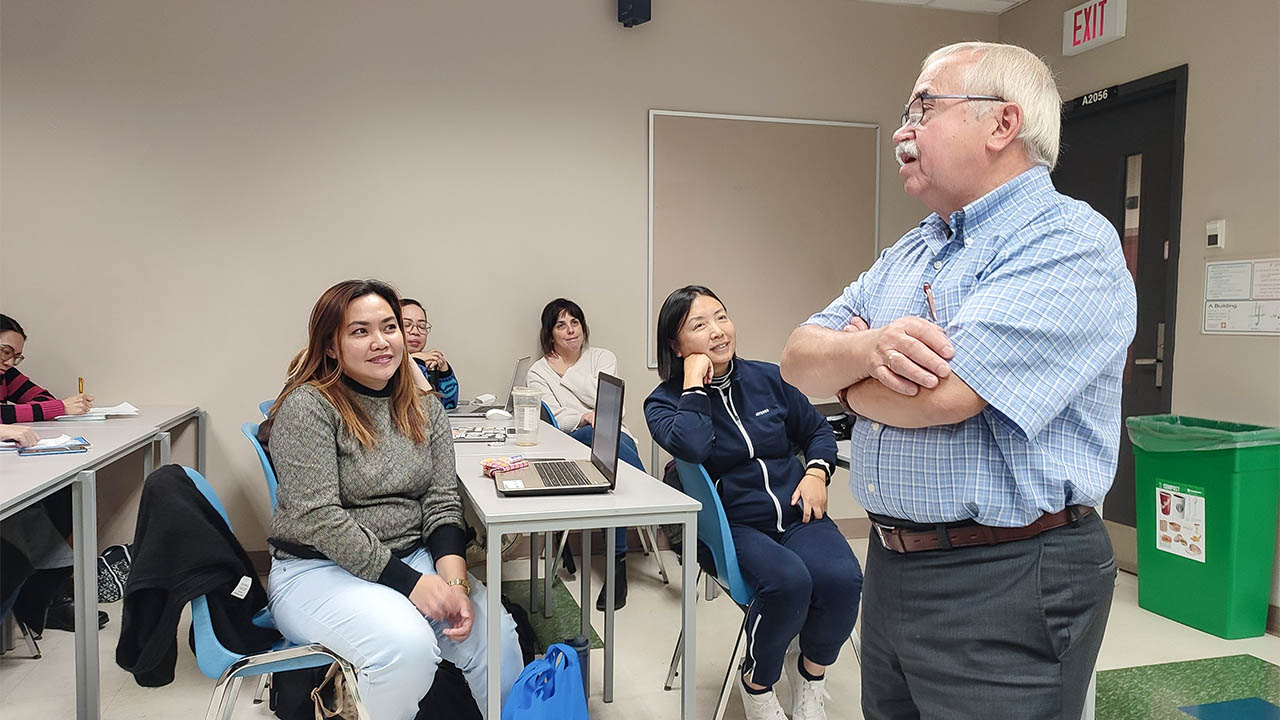Gerontology students get visits from older adults
 CREDIT: GRACIA ESPINOSA
CREDIT: GRACIA ESPINOSAOn Oct. 10, Jan Toporowski spoke to students at Fanshawe College about his life.
Statistics Canada’s most recent census, published last year, shows that from 2016 to 2021, the number of people aged 65 and older increased by seven million. The demographic forecast estimates that by 2051, the number of Canadians in the same age group could reach almost 12 million.
That’s why it’s more necessary than ever to prepare the next generation of gerontology professionals. The gerontology program at Fanshawe College aims to provide the knowledge, skills, and professional experience necessary to work with seniors.
“We look at the physical piece, but also the social piece, the spiritual piece, and their preferred environments,” explained the program coordinator of gerontology and interprofessional practice, Kim Schlegel.
Part of this experience comes from the Family and Community Practice course, which involves five adults between 69 and 99 years-old, visiting students and discussing their lives. The program is in partnership with the Parkwood Institute, and every term many residents agree to participate, like Jan Toporowski, who visited students on Oct. 10 to share his story.
70-year-old Toporowski arrived with his wife in Canada from Poland as a political refugee in 1984. Next year will mark the 40th anniversary of their arrival. They fled Poland to escape the control of the former Soviet Union. They could not see their relatives again until after the fall of the communist government, which happened in 1989.
“When we came to Canada, the phone calls to Poland were costly. Three dollars plus taxes for only one minute. But now, we can talk for free and even see their faces,” said Toporowski. His whole story is in the current exhibition Resilient London: Meet Your Neighbours at the Museum of London from Oct. 7 to May 12, 2024.
Toporowski and the other volunteers came to the college in person for the first time this semester, as this initiative started during the pandemic when students missed the opportunity for internships.
“We invited them on a Zoom call to join our class and tell us about their lives,” Schlegel said. “It was originally a plan to get more interaction between older adults and our students and give people in long-term care homes something to do.”
But now, Schlegel hopes that students get more out of it and get a bit of background before they go into placement next term.
“It’s important to hear from actual older adults, mainly because we’re learning about them. So, it’s good to have them in the narrative,” said Madeleine Campbell, one of the gerontology students. “If you talk to those older adults and see they’re still themselves, they have their own story. It humanizes them.”
Interestingly, Campbell and Toporowski discovered that they share Polish roots and a date of birth. Toporowski was born on Feb. 13, and Campbell was born on Dec. 13. The number is on her arm in a tattoo.
According to Schlegel the program aims to break down stereotypes and broaden perspectives on what it means to get older.
“When we think about older adults, we think about health. Or, more correctly, we think about disease. And so, we’re trying to break that down.”














